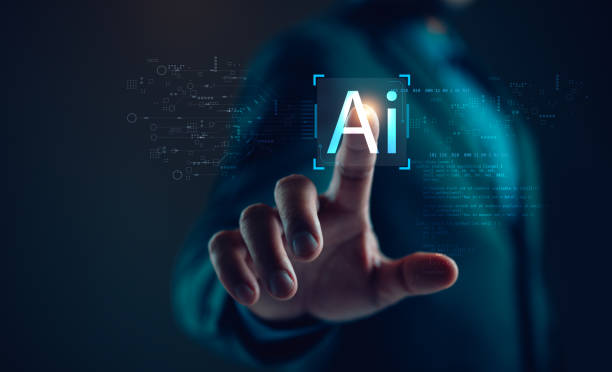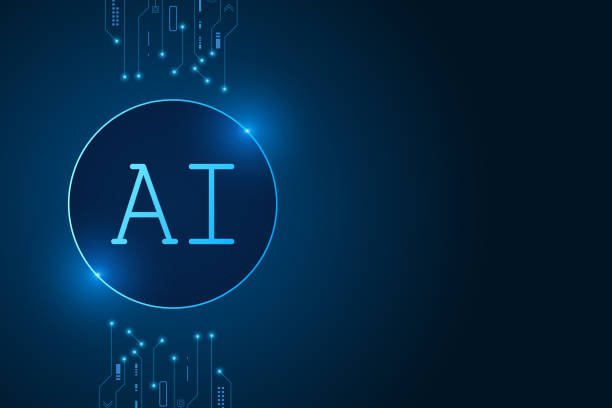Here’s the English translation of the provided Persian text:
“`html
What is Artificial Intelligence? Definitions and Basic Concepts
#Artificial_Intelligence (AI) is a branch of computer science that seeks to create machines capable of performing tasks that typically require human intelligence.
These tasks include learning, reasoning, problem-solving, natural language understanding, pattern recognition, and decision-making.
In simpler terms, the goal of AI is to enable computers to act intelligently.
Numerous definitions have been offered for artificial intelligence, but one of the most common is the definition by John McCarthy, one of the pioneers of artificial intelligence, who defines it as “the science and engineering of making intelligent machines.”
Artificial intelligence is not just a technology; it is a collection of techniques and algorithms that work together to give machines cognitive capabilities.
Key concepts in artificial intelligence include:
- Machine Learning Algorithms that allow computers to learn from data without explicit programming.
- Deep Learning A subset of machine learning that uses artificial neural networks with multiple layers to analyze data.
- Natural Language Processing The ability of computers to understand, interpret, and generate human language.
- Computer Vision The ability of computers to “see” and interpret images and videos.
- Robotics The design, construction, operation, and application of robots, often using artificial intelligence to control and guide them.
Artificial Intelligence is an integral part of life today and has many applications in various fields.
Are you tired of losing business opportunities due to not having a professional corporate website?
Rasaweb helps you with professional corporate website design:
✅ Build a powerful and reliable image of your brand
✅ Turn website visitors into loyal customers
⚡ Get free consultation now!
Types of Artificial Intelligence in Terms of Capability
Artificial intelligence can be divided into several main categories based on its capabilities:
- Narrow or Weak AI This type of artificial intelligence is designed to perform specific and limited tasks.
Most existing artificial intelligence systems are of this type.
Examples include virtual assistants such as Siri and Alexa, movie and music recommendation systems, and facial recognition software.
Narrow AI only works in the area it has been trained for. - General or Strong AI This type of artificial intelligence has cognitive abilities similar to humans.
A general artificial intelligence system can learn and perform any task that a human can do.
General AI has not yet been fully realized and is one of the long-term goals of artificial intelligence research. - Super AI This type of artificial intelligence surpasses human intelligence and can outperform the best human minds in terms of creativity, problem-solving, and general knowledge.
Super AI is still a theoretical concept, and there are concerns about its potential dangers.
Click here to preview your posts with PRO themes ››
Currently, most practical applications of artificial intelligence focus on Narrow AI, but research in the field of General AI continues.
Achieving General AI will be a major turning point in human history and could create profound changes in our lives.
Understanding these categories helps us understand what artificial intelligence is capable of and in what areas it can be useful.
Applications of Artificial Intelligence in Various Industries
Artificial intelligence has widespread applications in various industries and is constantly expanding.
Here are some of its most important applications:
- Medicine Disease diagnosis, drug development, robotic surgery, medical records management, and personalized care.
- Finance Fraud detection, risk management, algorithmic trading, financial advice, and automated customer service.
- Transportation Self-driving cars, route optimization, traffic management, and improved transportation safety.
- Retail Personalized product recommendations, inventory management, chat bots for customer support, and customer behavior analysis.
- Manufacturing Production line automation, quality control, equipment failure prediction, and supply chain optimization.
- Education Personalized learning, automated assignment evaluation, chat bots to answer student questions, and interactive educational content development.
These are just a few examples of the applications of artificial intelligence.
As technology advances, artificial intelligence is expected to play a more important role in our lives and affect more industries.
The table below shows examples of AI applications in the field of #medicine
| Application | Description |
|---|---|
| Disease Diagnosis | Using artificial intelligence algorithms to diagnose diseases from medical images or clinical data. |
| Drug Development | Using artificial intelligence to discover and develop new drugs with greater speed and accuracy. |
| Robotic Surgery | Using robots equipped with artificial intelligence to perform complex surgeries with high precision. |
Machine Learning and its Role in Artificial Intelligence
Machine learning is one of the main branches of artificial intelligence that allows machines to learn from data without explicit programming.
In fact, instead of direct programming, machine learning allows computers to identify patterns and relationships in data and use them for prediction or decision-making.
Machine learning algorithms are divided into two main categories:
- Supervised Learning In this method, the algorithm is trained using labeled data.
This means that the data is provided to the algorithm along with the correct answers, and the algorithm learns how to correlate inputs and outputs.
Examples include classifying emails as spam or non-spam and predicting housing prices based on their characteristics. - Unsupervised Learning In this method, the algorithm is trained using unlabeled data.
This means that the algorithm must automatically identify patterns and structures in the data.
Examples include clustering customers based on their purchasing behavior and detecting anomalies in financial data. - Reinforcement Learning In this method, an agent is placed in an interactive environment and receives rewards or penalties for performing various actions.
The agent’s goal is to learn a strategy that maximizes overall reward.
Examples include training robots to walk and play video games.
Machine learning plays a fundamental role in the development of artificial intelligence, and many applications of artificial intelligence, including facial recognition, natural language processing, and self-driving cars, are based on machine learning algorithms.
Applying machine learning has made artificial intelligence systems much more accurate and efficient.
Is your online store ready to attract maximum customers and sell more? Rasaweb transforms your online business with modern and efficient online store designs.
✅ Increased speed and improved SEO
✅ Excellent user experience on mobile and desktop⚡ Get a free online store design consultation from Rasaweb!
Challenges and Limitations of Artificial Intelligence
Despite significant advances, artificial intelligence still faces numerous challenges and limitations:
- Need for Large Data Sets Many machine learning algorithms, especially deep learning algorithms, require a large amount of data for training.
Collecting and preparing this data can be time-consuming and costly. - Interpretability Some artificial intelligence models, such as deep neural networks, are very complex, and it is difficult to understand how they make decisions.
This can be problematic in cases where transparency and accountability are required. - Bias If the data used to train the algorithms is biased, the artificial intelligence model will also be biased.
This can lead to unfair and discriminatory decision-making. - Security Artificial intelligence systems can be vulnerable to cyber attacks.
Hackers can disrupt system performance or steal sensitive information by manipulating data or algorithms. - Ethical Issues Artificial intelligence raises important ethical questions, including accountability for artificial intelligence decisions, privacy, and the impact of artificial intelligence on employment.
To overcome these challenges, there is a need for more research in various fields of artificial intelligence, the development of new tools for interpreting and evaluating models, and the creation of ethical frameworks for the development and use of artificial intelligence.
Also, training specialists in the field of artificial intelligence and raising public awareness about this technology is essential.
The Future of Artificial Intelligence and its Impact on Society
The future of artificial intelligence looks very bright.
With continued advances in technology, artificial intelligence is expected to play a more important role in our lives and have profound effects on society.
Some predictions about the future of artificial intelligence include:
- Expansion of Automation Artificial intelligence can automate many repetitive and tedious tasks, leading to increased productivity and reduced costs.
- Creation of New Jobs While artificial intelligence may eliminate some jobs, it will also create new jobs, especially in areas related to the development, deployment, and maintenance of artificial intelligence systems.
- Improvement of Health and Longevity Artificial intelligence can help in the early diagnosis of diseases, the development of new drugs, and the provision of personalized care, leading to improved health and increased longevity.
- Changing the Nature of Education Artificial intelligence can personalize education and help students progress at their own pace and learning style.
- Creation of Smart Cities Artificial intelligence can help manage traffic, energy consumption, and urban services, leading to more efficient and sustainable cities.
However, to fully exploit the benefits of artificial intelligence and reduce its potential risks, there is a need for careful planning, investment in education and research, and the creation of appropriate legal and ethical frameworks.
Artificial intelligence will shape our future.
An Overview of the Most Important Machine Learning Algorithms
In this section, we will discuss some of the most important machine learning algorithms and examine their applications:
- Linear Regression A simple and widely used algorithm for predicting a continuous variable based on one or more independent variables.
Examples include predicting housing prices based on area and location. - Logistic Regression An algorithm for classifying data into two or more categories.
Examples include distinguishing spam from non-spam and diagnosing disease based on its symptoms. - Support Vector Machines A powerful algorithm for classifying and regressing data.
Examples include facial recognition and fraud detection. - Decision Trees An algorithm for making decisions based on a series of simple rules.
Examples include credit risk assessment and disease diagnosis. - Random Forest An algorithm that combines multiple decision trees to improve prediction accuracy.
Examples include fraud detection and stock price prediction. - Neural Networks A complex algorithm inspired by the structure of the human brain.
Neural networks are used for a wide range of tasks, including image recognition, natural language processing, and time series prediction. - Clustering Algorithms Algorithms for grouping data based on their similarities.
Examples include clustering customers based on their purchasing behavior and clustering documents based on their topic.
Choosing the right algorithm for a particular problem depends on various factors, including the type of data, the volume of data, and the required accuracy.
Learning and understanding these algorithms is essential for anyone who wants to work in the field of artificial intelligence.
The table below shows examples of the application of machine learning algorithms
| Algorithm | Application |
|---|---|
| Linear Regression | Predicting Housing Prices |
| Support Vector Machine | Facial Recognition |
| Decision Tree | Credit Risk Assessment |
Artificial Intelligence and Ethics: Important Considerations
As the use of artificial intelligence expands, ethical issues related to this technology become more important.
The decisions that artificial intelligence systems make can have a profound impact on people’s lives, and it is necessary that these decisions are made fairly, transparently, and responsibly.
Some of the most important ethical considerations in the field of artificial intelligence include:
- Bias As mentioned earlier, artificial intelligence algorithms can be biased if the data used to train them is biased.
To prevent this, the data must be carefully collected and processed, and the algorithms must be designed to reduce bias. - Privacy Artificial intelligence systems often have access to a lot of personal information.
This information must be protected responsibly, and individuals’ privacy must be maintained. - Accountability If an artificial intelligence system makes a wrong decision, who will be responsible? This is a question that does not yet have a clear answer.
It is necessary to create legal and ethical frameworks to determine accountability for artificial intelligence decisions. - Impact on Employment Artificial intelligence can eliminate many jobs.
It is necessary to create programs to retrain workers and create new jobs to prevent the negative effects of artificial intelligence on employment. - Control Who should control artificial intelligence? This is an important question whose answer can have a significant impact on the future of artificial intelligence.
Extensive discussions on this topic need to be held, and a decision should be made that benefits society.
Attention to these ethical considerations is essential for the responsible development and use of artificial intelligence.
Artificial intelligence should be used as a tool to improve people’s lives and not to harm them.
Artificial intelligence principles should be considered.
Does your current website create the trust that potential customers should have in your business? If the answer is no, it’s time to have a professional and impactful corporate website with Rasaweb.
✅ Completely customized design to match your brand identity
✅ Increased lead generation and credibility of your business in the eyes of customers⚡ Contact us for a free consultation!
Resources and Tools for Learning Artificial Intelligence
If you are interested in learning artificial intelligence, there are many resources and tools to get started:
- Online Courses Educational platforms like Coursera, edX, Udacity, and Skillshare offer a variety of courses in the field of artificial intelligence.
- Books There are many books on artificial intelligence that you can use to learn basic and advanced concepts.
- Articles and Blogs There are many articles and blogs about artificial intelligence that you can use to stay up-to-date with the latest advances.
- Online Communities There are many online communities for artificial intelligence enthusiasts where you can ask your questions and share with others.
- Development Tools There are many development tools for working with artificial intelligence, including TensorFlow, PyTorch, and scikit-learn.
Using these resources and tools, you can gain the knowledge and skills necessary to enter the world of artificial intelligence.
Get started and enjoy learning!
Summary and a Look at the Future of Artificial Intelligence
In this article, we comprehensively examined artificial intelligence and reviewed its basic concepts, types, applications, challenges, ethical considerations, and learning resources.
Artificial intelligence is a powerful technology that can have a profound impact on society.
With continued advances in technology, artificial intelligence is expected to play a more important role in our lives and affect more industries.
Artificial intelligence is transforming the world
To fully exploit the benefits of artificial intelligence and reduce its potential risks, there is a need for careful planning, investment in education and research, and the creation of appropriate legal and ethical frameworks.
Artificial intelligence should be used as a tool to improve people’s lives and not to harm them.
The future of artificial intelligence is bright, but it is our responsibility to ensure that this technology is developed and used in a way that benefits everyone.
Frequently Asked Questions
| Question | Answer |
|---|---|
| What is artificial intelligence? | It is a simulation of human intelligence in machines programmed to think like humans and mimic their actions. |
| What are the main branches of artificial intelligence? | They include machine learning, deep learning, natural language processing, computer vision, and robotics. |
| What is Machine Learning? | It is a branch of AI that focuses on enabling systems to learn from data and identify patterns without explicit programming. |
| Give examples of AI applications in our daily life. | Voice assistants (like Siri and Alexa), recommendation systems on Netflix and Amazon, self-driving cars, and facial recognition software. |
| What is Deep Learning? | It is a subset of machine learning that uses multi-layered (deep) artificial neural networks to process large amounts of data. |
| What is Natural Language Processing (NLP)? | It is a branch of AI that focuses on enabling computers to understand, interpret, and generate human language. |
| What are some ethical concerns related to AI? | They include bias in data, privacy, job loss, and responsibility in case of errors. |
| What are the main benefits of AI? | Increased efficiency, improved decision-making, automation of repetitive tasks, and detection of complex patterns in data. |
| How is AI used in healthcare? | In disease diagnosis, drug discovery, medical image analysis, and personalized patient care. |
| How do you see the future of AI? | It is expected to continue evolving at a rapid pace, affecting all aspects of human life, from industry to education and entertainment. |
And other services of Rasa Web Advertising Agency in the field of advertising
Smart Link Building: A combination of creativity and technology to attract customers through dedicated programming.
Intelligent Customer Journey Map: An effective tool to increase click-through rates with the help of marketing automation.
Smart Conversion Rate Optimization: A fast and efficient solution to increase sales by focusing on optimizing key pages.
Intelligent Content Strategy: A creative platform for improving digital branding using real data.
Smart Social Media: A creative platform for improving customer behavior analysis with targeted audience targeting.
And more than a hundred other services in the field of internet advertising, advertising consulting and organizational solutions
Internet Advertising | Advertising Strategy | Advertorial
Sources
What is Artificial Intelligence? Everything You Need to Know About AI – Aryanic
,What is Artificial Intelligence? – Virgool
,Artificial Intelligence Definition – Techopedia (English)
,Artificial Intelligence (AI) – IBM
? To achieve your digital marketing goals and have a unique dedicated website design, Rasaweb is your best choice. With us, transform your business in the online world.
📍 Tehran, Mirdamad Street, next to the Central Bank, South Kazerun Alley, Ramin Alley No. 6
“`













